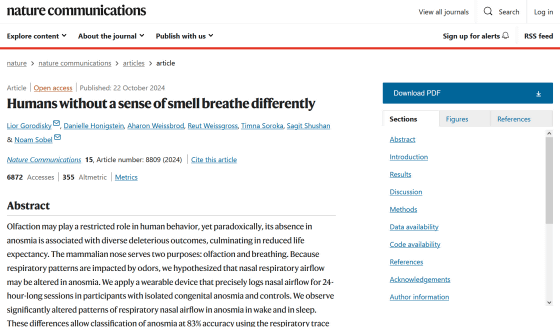It turns out that people with and without a sense of smell breathe differently, which may affect their physical and mental health

Compared to senses such as sight and hearing, smell is a less important sense. In fact, in a 2011
Humans without a sense of smell breathe differently | Nature Communications
https://www.nature.com/articles/s41467-024-52650-6

Your Sense of Smell Changes The Way You Breathe, Study Reveals : ScienceAlert
https://www.sciencealert.com/your-sense-of-smell-changes-the-way-you-breathe-study-reveals
The sense of smell is often overlooked, but people who have lost their sense of smell as a result of COVID-19 feel a great sense of discomfort when they are unable to smell food. Research has also shown that elderly people who have lost their sense of smell are three times more likely to die than those who have a good sense of smell, suggesting that the sense of smell actually has a significant impact on the human mind and body.
Previous research has shown that when the strength of the odor in the air weakens, the amount of air inhaled through the nose increases relatively. Also, even while sleeping, if there is a strong odor in the air, the amount of air inhaled through the nostrils decreases. If the way we breathe changes depending on the strength of the odor, it is possible that the presence or absence of a sense of smell also affects our normal breathing.

A research team from
When the subjects' breathing was monitored over a 24-hour period, the smell-control group showed multiple small resistances to each breath, with peaks of inhalation occurring 240 times per hour, whereas the smell-deprived people showed no such peaks, revealing a distinct difference in the way they breathed.
In the figure below, the left (C) is a graph showing the amount of air inhaled by a person without a sense of smell, and the right (D) is a graph showing the amount of air inhaled by a person with a sense of smell. Within the range of the graph, each person takes four breaths, but while the person without a sense of smell only has one peak for each breath, the person with a sense of smell has two to three small peaks for each breath.

It is unclear how different breathing patterns depending on whether or not one has a sense of smell affect people. However, given that human brain function is strongly related to breathing, the research team argued that the presence or absence of smell may have physiological and psychological effects on health as well as quality of life.
Related Posts:
in Science, Posted by log1h_ik






